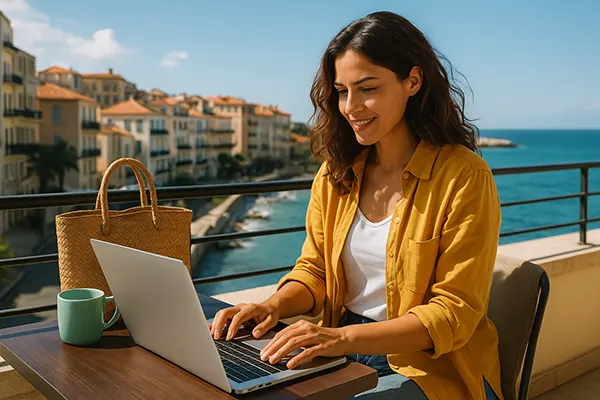
Living Between Countries: A Guide for Digital Nomad Women
As of early 2025, the number of women embracing the digital nomad lifestyle continues to grow. More and more professionals are working remotely, often balancing life between two or more countries. While this offers freedom and inspiration, it also presents a series of logistical, financial, and emotional challenges. This guide outlines the key areas every digital nomad woman should consider to successfully navigate this modern way of life.
Managing Finances Across Borders
One of the most complex parts of living between countries is managing your finances. Having multiple bank accounts in different jurisdictions can simplify local transactions, help avoid unfavourable exchange rates, and make budgeting easier. Many digital nomads use services such as Wise or Revolut to maintain multi-currency accounts, which allow for seamless money transfers and low fees.
When it comes to taxation, it’s crucial to understand your tax residency status. Each country has its own definition, often tied to the number of days spent there. It’s advisable to consult with an international tax advisor to avoid double taxation or accidental non-compliance. Some countries, like Portugal and Georgia, offer favourable tax schemes for digital nomads.
Make sure to declare your income transparently and keep detailed records of all transactions. Use digital accounting tools like Xero or QuickBooks, especially if you run your own business. This ensures smooth communication with authorities, wherever you are.
Opening and Using Bank Accounts
Opening a bank account as a non-resident can be tricky, but not impossible. Countries like Germany, Estonia, and Singapore offer digital banking services with easier onboarding processes for foreigners. Look for banks that accept proof of income and ID verification remotely.
Always keep one primary account in a stable banking system that you can access internationally. Pair it with local accounts only where you spend extended time. This reduces unnecessary fees and currency conversion losses.
Security should also be a top priority. Use two-factor authentication, regularly change passwords, and avoid public Wi-Fi when accessing sensitive financial data.
Maintaining Routine While Travelling
Maintaining stability in your day-to-day life while switching locations is a common challenge. A consistent routine helps preserve mental clarity, productivity, and personal well-being. Start by setting core working hours and sticking to them regardless of time zone shifts. Use time-tracking apps like Toggl or Clockify to monitor consistency.
Choose accommodations with a reliable workspace. Co-living spaces and serviced apartments often provide quiet environments and fast internet. Avoid locations that prioritise leisure over practicality, especially if you’re on deadline.
Physical health is just as important. Find a type of exercise you can do anywhere—yoga, bodyweight workouts, or running. Use apps like Down Dog or Nike Training Club, and pack compact equipment like resistance bands or a jump rope.
Creating a Personal Structure
Start each day with a morning ritual—whether it’s journaling, meditation, or a short walk. This creates a sense of control and familiarity, even in unfamiliar settings.
Meal planning can also bring stability. Shop for groceries instead of always eating out, and cook simple dishes. Familiar meals create a sense of home and help maintain health.
Limit your destinations per year to avoid burnout. Spending at least 2-3 months in one place allows deeper cultural immersion and a more sustainable lifestyle.
Visas and Legal Requirements for Nomads
Digital nomad visas are becoming more common, with over 40 countries offering some form of long-stay visa for remote workers. Nations like Spain, Croatia, and Costa Rica have developed visa programs specifically for freelancers and entrepreneurs. These usually require proof of income, health insurance, and background checks.
Before applying, research whether your profession qualifies. Some countries exclude certain industries, while others require specific qualifications or degrees. Be sure to check the processing times, required documents, and validity period of each visa.
Always have digital and physical copies of all essential documents—passport, visa, proof of income, health insurance, etc. Store them securely using services like Dropbox or encrypted cloud solutions. Also, consider registering with your embassy in case of emergencies.
Best Practices for Visa Applications
Start visa planning at least three months in advance. Visa processing can be slow, and missing documents may cause delays. Read official embassy websites, and avoid relying solely on online forums.
Seek professional legal help if necessary, especially for long-term or multi-country itineraries. Immigration laws change frequently, and expert guidance can save time and stress.
Track visa expiry dates and apply for extensions early. Overstaying can lead to fines or bans, affecting your ability to return in the future.

Emotional Resilience and Building a Sense of Home
Frequent travel can take a toll on mental health. While the freedom of movement is empowering, the lack of stable relationships and familiar environments can cause loneliness and anxiety. Building emotional resilience is key to enjoying a balanced nomadic lifestyle.
Create an emotional anchor—a regular video call with family, a journal, or a personal blog. This keeps you grounded and helps maintain long-distance connections. Additionally, establish rituals for each move, such as setting up your space or exploring the local neighbourhood on foot.
Make socialising a priority. Join local clubs, attend co-working events, or use platforms like Meetup and Internations. Social routines offer a sense of belonging and ease transitions.
Staying Mentally Grounded
Accept that homesickness is natural. Rather than resisting it, integrate practices that support your emotional well-being—mindfulness, therapy apps like BetterHelp, or even occasional therapy sessions with professionals familiar with expatriate life.
Define what “home” means to you. It might be a person, a digital space, or a routine. Recognising and nurturing that idea brings consistency and comfort.
Set boundaries with work and personal time. Without structure, it’s easy to drift. Respect your downtime and take full weekends off when possible, even while abroad.




